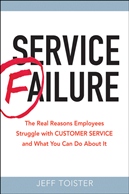Are your supervisors creating service problems?
 Jeff Toister
Jeff Toister  Thursday, June 16, 2011 at 10:39AM |
Thursday, June 16, 2011 at 10:39AM | "Praise in public, reprimand in private" is a business maxim that almost everyone has heard of. I witnessed a prime example of why this is true while enjoying a light breakfast in a bakery last week.
 My morning serenity was shattered by a loud, piercing voice coming from behind the bakery counter. It caught my attention and I looked up to see a woman who appeared to be a supervisor addressing three other employees.
My morning serenity was shattered by a loud, piercing voice coming from behind the bakery counter. It caught my attention and I looked up to see a woman who appeared to be a supervisor addressing three other employees.
“This is the second ticket mess-up! Ladies, this ticket has been sitting here for five minutes! Please be careful!”
Her words, tone, and demeanor were all unpleasant and all the customers in the bakery were staring as her employees shirked away from her verbal tirade.
My breakfast was suddenly much less enjoyable.
The obvious point to this story is it is never a good idea to reprimand an employee in public unless someone is in immediate physical danger. However, I’m willing to bet that even the screeching supervisor would know this if you removed her from the heat of the moment.
So, why did she do it anyway?
It's hard to know her specific motivations, but if I owned the bakery I certainly wouldn't want to see this type of behavior from one of my supervisors.
Business leaders and owners need to do three things to make sure their supervisors are effectively representing the business and not becoming the source of poor customer service.
Assess job fit. People often get promoted because they are really good at their job, but leading others is a completely different skill set. Business leaders need to make sure their supervisors have what it takes to effectively lead other people. If the bakery owner hired a supervisor who doesn't have the make-up to do that job then I blame the bakery owner, not the supervisor.
Reduce pressure. Supervisors are expected to handle pressure, but everybody has their breaking point. When business owners cut costs, they can sometimes leave their supervisors feeling like they are trying to put out a blazing house fire with a squirt bottle. Business leaders need to make sure they provide the resources necessary to get the job done.
Supervise the supervisor. Supervisors are entrusted with a lot of responsibility, but they are employees too. They need coaching, guidance, and support like everyone else. If the bakery owner is never around to see and correct poor behavior, it’s likely that the supervisor will make a habit of yelling at employees in front of customers.







